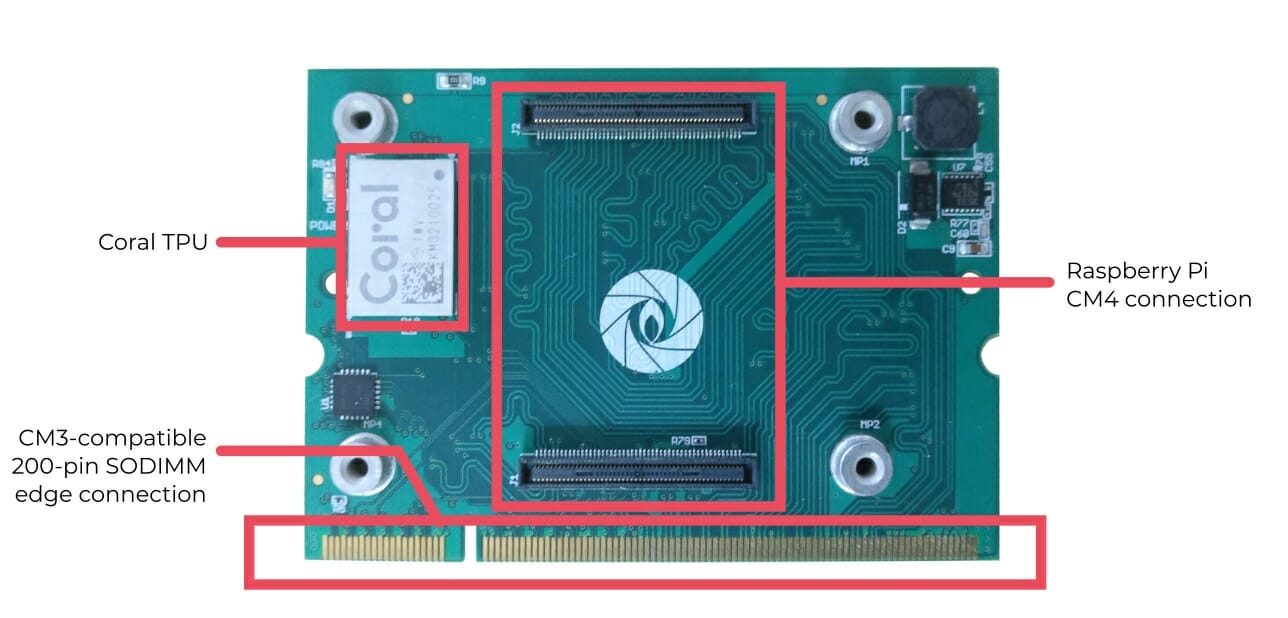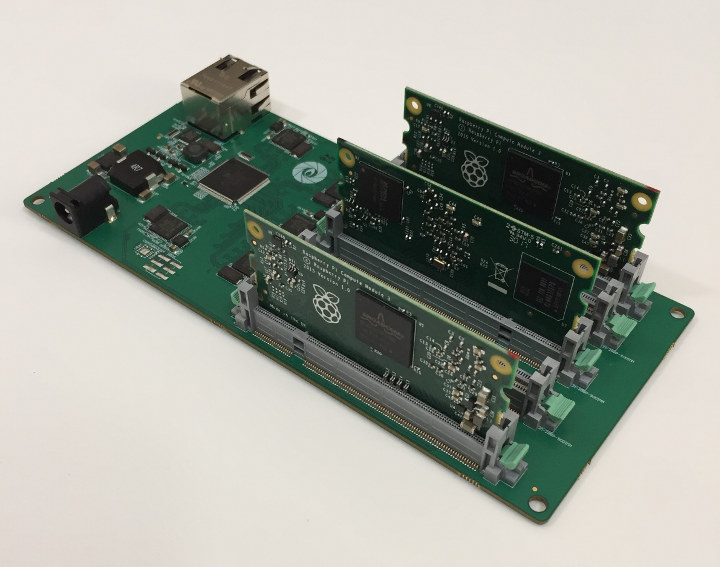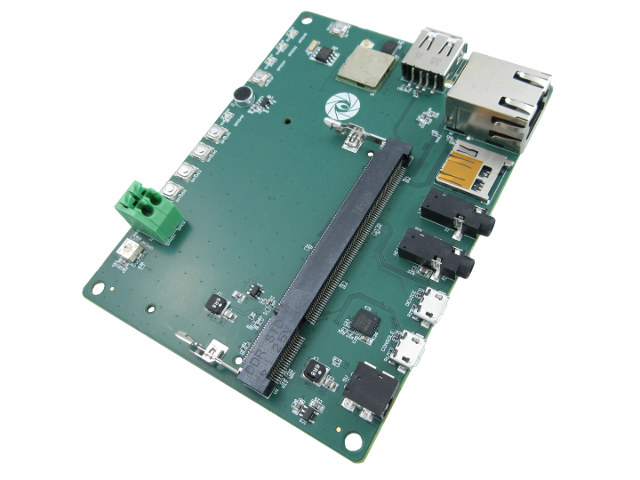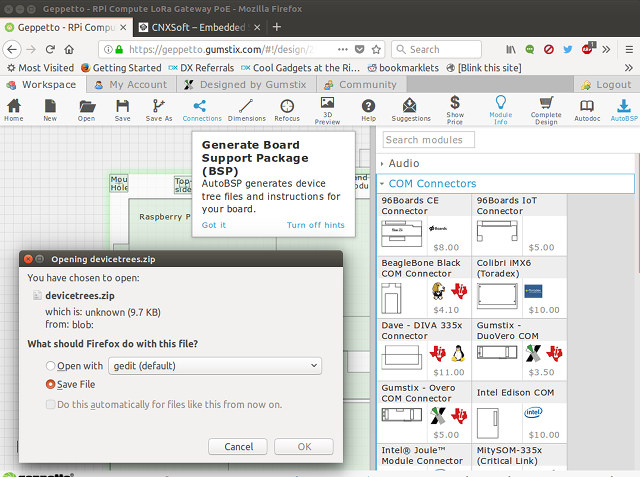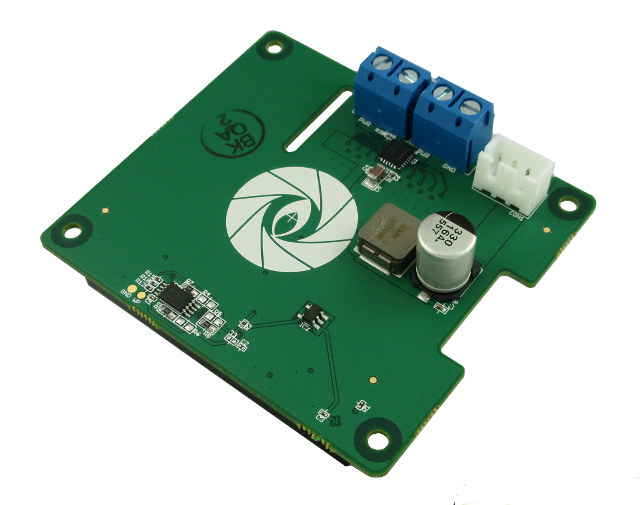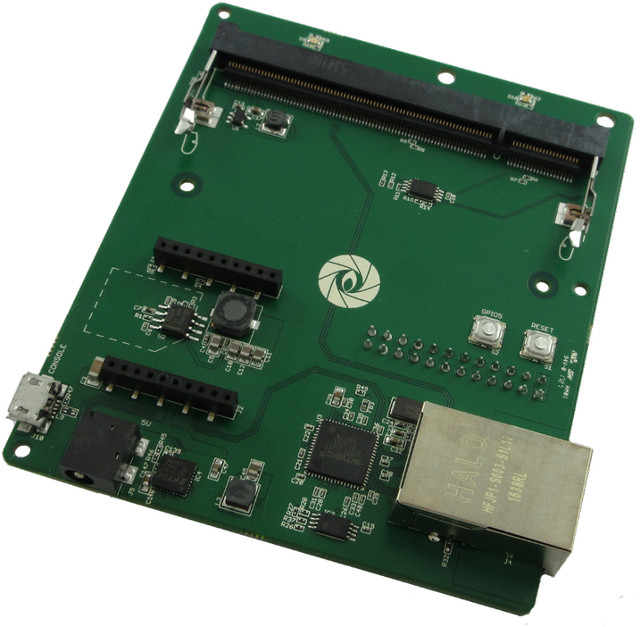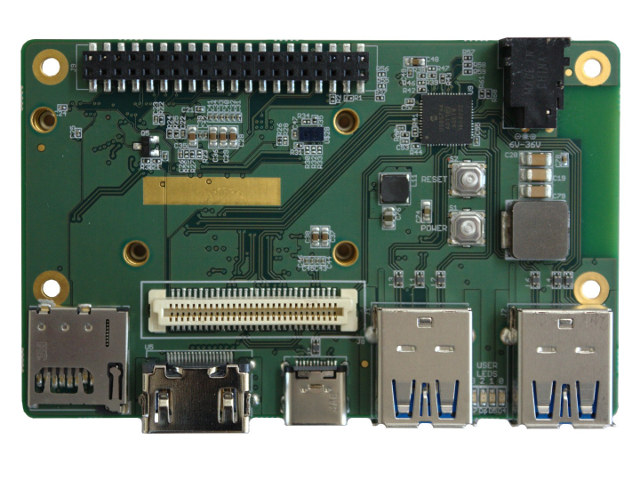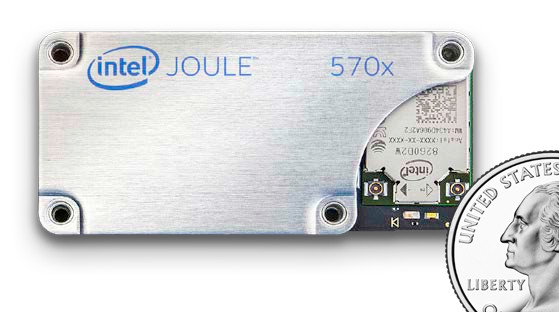Raspberry Pi Trading has just launched 32 different models of Raspberry Pi CM4 and CM4Lite systems-on-module, as well as the “IO board” carrier board. But the company has also worked with third-parties, and Gumstix, an Altium company, has unveiled four different carrier boards for the Raspberry Pi Compute Module 4, as well as a convenient CM4 to CM3 adapter board that enables the use of Raspberry Pi CM4 on all/most carrier boards for the Compute Module 3/3+. Raspberry Pi CM4 Uprev & UprevAI CM3 adapter board Gumstix Raspberry Pi CM4 Uprev follows the Raspberry Pi Compute Module 3 form factor but includes two Hirose connectors for Computer Module 4. The signals are simply routed from the Hirose connectors to the 200-pin SODIMM edge connector used with CM3. Gumstix Raspberry Pi CM4 Uprev is the same except it adds a Google Coral accelerator module. Gumstix Raspberry Pi CM4 Development Board Specifications: […]
MiniNodes Raspberry Pi 3 CoM Carrier Board Takes up to 5 Compute Modules 3
Mininodes is known for their hosting services based on Arm development boards such as Cubieboard2, 96Boards Hikey, or Raspberry Pi 3, but the company unveiled their own hardware platform at Arm TechCon 2018 with miniNodes Raspberry Pi CoM (Computer-on-Module) carrier board that takes up to five Raspberry Pi Compute Modules 3. Beside the five sockets for CM3 / CM3L modules, the carrier board is also equipped with a gigabit Ethernet switch and RJ45 connector, as well as a DC jack to power the whole setup. The white round logo on the board most certainly means mininodes designed the board with Gumstix Geppeto web platform that allows you to fairly easily design your own custom boards in a web browser without having to draw schematics, and then handle the PCB layout. The company explains the Raspberry Pi 3 CoM Carrier Board can be used to provide edge compute capacity in remote […]
Gumstix Chatterbox is a Customizable, AVS-Ready Development Platform based on Toradex Colibri i.MX7 SoM
There are several official Amazon Voice Service (AVS) development kits, and we’ve already covered a few of them with the likes of Allwinner 3-Mic Far Field AVS Development Kit or Intel Speech Enabling Developer Kit, but you can also design your own board conformant to Amazon’s Alexa Voice Service functional design guide. That’s exactly what Gumstix has done with Chatterbox carrier board for Toradex Colibri i.MX7 system-on-module powered by NXP i.MX7 Arm Cortex A7 processor. Designed in Geppeto, the board includes a 2.5-Watt speaker driver, an on-board microphone, and Line IN and headphone jacks, as well as WiFi, Bluetooth and Ethernet for connectivity. Gumstix Chatterbox specifications: Colibri iMX7 SO-DIMM socket Storage – microSD card slot Audio – On-board microphone; 2.5W speaker driver; Line-in & headphone jacks Connectivity – Gigabit Ethernet, 802.11 b/g/n WiFi & Bluetooth 4.1 LE (TI WiLink8 WL1831) with u.FL antenna connector USB – 1x micro USB […]
Gumstix AutoBSP Automatically Generates Device Tree Files for Hardware Designed with Geppetto
Gumstix launched Geppetto Design-To-Order (D2O) system back in 2013, and at the time you could design complete baseboard for their Overo CoMs right in your Chrome or Firefox web browser, and once complete, order the board from the website. The system is meant to save you time, and “design” here does not mean drawing schematics, and laying out PCBs, but instead selecting board size, and adding ports as needed. Since then, the company has added support for more modules, and you can now easily build you own baseboard for Raspberry Pi Compute Module, Technexion PICO-IMX6 module, Toradex Colibri SoM, 96Boards Mezzanine, and they even have Beaglebone Black and 96Board CE or IoT connectors, among others. Support for Qualcomm DragonBoard 410c, Atmel (Arduino) , and STMicro platforms is also being worked on. Their latest feature – AutoBSP – automatically generates device tree files for your custom boards, so you can simply […]
Gumstix Expands Raspberry Pi Support with Stepper Motor, Breakout Board, LoRa PoE, and Yocto Linux
Gumstix has recently released of three new expansion boards compatible with Raspberry Pi boards and Compute Modules: Gumstix Pi Stepper HAT for 4-wire stepper motors Gumstix Pi Newgate breakout boards exposing all I/Os of Raspberry Pi Compute Module and Compute Module 3 Gumstix Pi Conduit PoE adding PoE support to their LoRa gateway kit based on RisingHF RHF0M301 LoRa concentrator module. The company also offers a custom Yocto 2.2 (Morty) Linux images with support for their Pi HATs and Compute Module carrier boards. Gumstix Pi Stepper HAT The expansion board is designed with the 40-pin header for Raspberry Pi products, and includes Texas Instruments DRV8846, a 4 – 18V, 1.4A stepper motor driver with 1/32 microstepping providing rotational accuracy below a tenth of a degree, and 6,400 distinct positions. The board supports 6 to 36V batteries via a 3-pin headers, includes 256 kbit serial EEPROM, and can be used for […]
Gumstix Pi Conduit Gateway Board Leverages Raspberry Pi Compute Module, Off-the-Shelf LoRa and Cellular Modules
Gumstix has designed Pi Conduit Gateway baseboard for both the Raspberry Pi Compute Module and RisingRF RHF0M301 LoRa gateway module, in order to create a Linux based LoRa gateway that can optionally support LTE or other cellular connectivity via NimbeLink Skywire cellular modem. Conduit Pi LoRa Gateway board specifications: 200-pin SO-DIMM connector for Raspberry Pi Compute Module / Raspberry Pi 3 Compute Module (CM3 / CM3L) Headers for RisingRF RHF0M301 LoRa Module NimbeLink Skywire 2G/3G/4G cellular modem connector Low profile 10/100M Ethernet jack (implemented via USB 2.0) USB – 1x micro USB port for debugging via an FTDI USB to TTL chip Misc – User (GPIO5) and reset buttons Power Supply – 5V via power barrel The board was designed using Geppetto, which means you should be able to customize it to your needs by modifying it the original design in a web browser, and order your brand new custom […]
Gumstix Nodana 96BCE 96Boards Compatible Baseboard Takes Intel Joule Module
96Boards is an initiative from Linaro, an engineering organization focusing on ARM development, to define some hardware and software specifications for development boards. But since 96Boards specifications are open, Gumstix decided to create the first x86 board compliant with 96Boards CE hardware specifications with Nodana 96BCE baseboard powered by Intel Joule Module. For obvious reasons, this will never be an officially supported 96Boards.org platform. Nodana 96BCE board specifications: SoM – Intel Joule Module based on Intel Atom T5700 or T5500 processor with up to 16GB storage, 4GB RAM. External Storage – 1x micro SD card Video Output – 1x HDMI port USB – 2x USB 3.0 ports, 1x USB 3.0 type C port Expansion Headers 96Boards Low Speed connector with I2C, SPI and UART 96Board High Speed connector with MIPI DSI and USB 2.0 Power Supply – 8 to 18 V (if it follows 96Boards CE specs) Dimensions – 85 […]
Intel Unveils Joule Compute Module and Devkit for IoT based on Atom T5500 & T5700 Processors
As the Intel Developer Forum 2016 is now taking place in San Francisco, Intel has unveiled the Joule Compute Module and development kit targeting IoT applications. The module is not for low cost and low power sensor nodes however, as it features a powerful quad core Atom processor running at 1.5+ GHz, so it more suited to IoT gateways, or other application requiring lots of processing power to handle sensor data. Two models of the Joule module have been introduced: Intel Joule 570x platform SoC – Intel Atom T5700 64-bit quad-core processor @ 1.7 GHz / 2.4 GHz (Burst frequency) with Intel HD Graphics with 4K video capture and display System Memory – 4GB LPDDR4 RAM Storage – 16GB eMMC memory Connectivity – 802.11ac Wi-Fi with MIMO and Bluetooth 4.1 Other interfaces – USB 3.0, MPI CSI and DSI interfaces, and multiple GPIO, I2C, UART interfaces Intel Joule 550x platform […]


